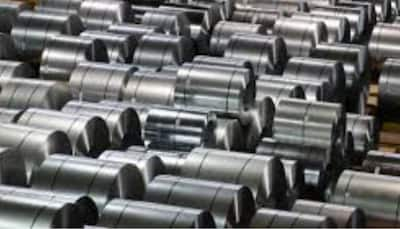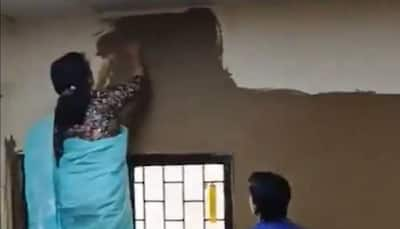A video allegedly shared in a teachers’ WhatsApp group by the principal of Delhi University’s Laxmibai College shows classroom walls being coated with cow dung. The footage, which has since gone viral, features the principal herself applying the dung, drawing significant backlash on social media.
The principal, Pratyush Vatsala, told PTI that the act was part of an ongoing research project led by a faculty member. She said the study, titled ‘Study of Heat Stress Control by Using Traditional Indian Knowledge,’ is still in progress.
“It is under process. I will be able to share details of the full research after a week. The research is being carried out in porta cabins. I coated one of them myself because there’s no harm in touching natural mud. Some people are spreading misinformation without knowing the full details,” Pratyush Vatsala said.
The principal of Delhi University’s Laxmibai College has been caught on video smearing cow dung on the walls of the classroom. When asked, Principal Pratyush Vatsala said that this act was done as a part of religious sentiment.
The video shows Principal Pratyush Vatsala, along with some staff members, applying the mixture to the walls while explaining that traditional methods were being used to cool the classrooms in C Block.
“Those who have classes here will soon get these rooms in a new look. Efforts are being made to make your teaching experience pleasant,” she wrote in the message.
Cow dung is a natural thermal insulator. When mixed with mud and applied to walls or floors, it reduces heat transfer from the outside to the inside, keeping interiors significantly cooler during the summer months.
The mixture of cow dung and earth forms a porous material, allowing the walls to “breathe.” This breathability facilitates the slow exchange of air and moisture, which naturally regulates indoor temperatures and prevents overheating.
When dried, cow dung often appears light brown in color. This lighter surface reflects sunlight, unlike darker concrete or asphalt, which absorb and trap heat. This reflective property contributes to keeping interiors cool.
Cow dung plaster tends to retain a bit of moisture. As this moisture slowly evaporates during the day, it provides a natural cooling effect — much like how sweat cools the body.
Cow dung has low thermal conductivity, meaning it doesn’t easily transfer heat. This property ensures that even when it’s hot outside, the internal walls and floor surfaces remain relatively cool.
Apart from cooling, cow dung is also anti-bacterial, deterring pests and insects. Its use as a building material is eco-friendly and sustainable, reducing the need for energy-intensive cooling systems like air conditioners.
Stay informed on all the , real-time updates, and follow all the important headlines in and on Zee News.










